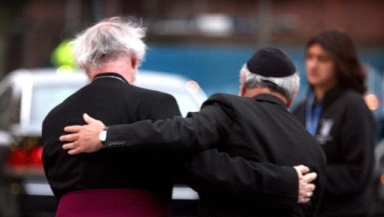
What are the three pillars of Judaism? What are the threesome that hold Judaism up so that it carries on under adversity and refuses (despite the best efforts of others) to be swallowed up, fade away, or die?
Believe it or not, Judaism has been around for 4000 years, and is often flourishing in unexpected places.
For whenever Judaism is reviled, beaten up, expelled or murdered, it always pops up again, unexpectedly, and does so with grace, thoroughly enriching the areas it currently inhabits.
So what do Christians think are the reasons for Judaism's astonishing survival against the odds?
These are the views of former Archbishop of Canterbury Dr Rowan Williams
'The things that come to mind for me are 1) Torah, obviously, and thus the notion of covenant. 2) The Land as the enduring sign of divine promise and fidelity. 3) And I suppose that this may have something to do with the way Christians have picked this up – the idea of a 'priestly' people, called to be obedient to the Almighty for the sake of the whole human world.'
And:
'I should have added about the tradition of study and learning … the whole idea that there is a text given by the Almighty which enables endless exploration and growth in wisdom is of course the really important part of the role of the Torah.'
So to sum up, Rowan's three pillars are Torah (learning and interpretation), Land (place) and Jews (a special people), who by their very existence are an example to the world. For it's not merely survival that he describes, but a call for Jews 'to be obedient to the Almighty for the sake of the whole human world.'
Quite a tall order for a tiny battered people of only 15 million (nearly half of whom now live in Israel) however resilient.

Canon Guy Wilkinson's three favourite Jewish pillars are
'Torah, Temple service and deeds of kindness.' This trilogy is taken from Pirke Avot (The Sayings of the Fathers) written at the time of Jesus and featuring in daily Prayer Books, as part of the Mishnah.
Here are Phil Pegum's three most memorable Jewish radio events:
Phil Pegum is a BBC radio producer of 33 years' experience, 21 of these in religious broadcasting, including the last 10 years producing The Moral Maze.
Phil comes to the question from a practical standpoint: What three Jewish events have stood out for him in the last 20 years?
'I remember when we did the series In the Footsteps of Moses (2003) and a Jewish historian at Cambridge was explaining about the idea of being "a light unto the nations" and how fascinating that was – but he also asked the question about how Jews should interpret the injunction today
'The second happened just after I joined the religion department – it was the row over Jonathan Sacks not attending the funeral of Hugo Gryn'
'The third is the first time I took a lift in Israel on Shabbat and discovered that they stop on every floor. What ingenuity!'
So to sum up three views on Judaism, we have the trilogies of Torah, Land and people; another trilogy of Torah, service and kind deeds; and a third trilogy of how to put abstract concepts into practice in the contemporary world.
One could add other trilogies, such as the Rosh Hashana (Jewish New Year) trilogy of repentance, prayer and charity, or the Micah trilogy of doing justice, loving kindness and walking humbly with one's G-d (Micah 6:8).
But building on all the above I would like to suggest another trilogy for the present age, a trilogy of humility, humour and hutzpah.
Hutzpah - what the Russian dissident, Irina Ratushinskaya, used to call holy disobedience - is what Jews in the diaspora lack in spades.
Jews in the diaspora are good at humble and good at humour – no wonder Jews are overlooked in the political, religious, academic and public spheres, while remaining the life and soul of the party. Jews are fun, good for a laugh.
Of all religions, people like Jews best:
But when it comes to taking them seriously…. Let's face it, Jews tend to be, in diaspora at least, the court jesters of life. From Augustine to Hitler, from Vespasian to UNESCO, that's been their one role – to amuse, to advise – and then to be persecuted.
Just look around, just look around Europe today. In fact, to be very specific, just look at streets here in Broughton Park, Salford and see what is happening. There's no point denying it – in fact denial is simply criminal in the face of reality.
By contrast, hutzpah is what the State of Israel has in spades. Israelis know that humility and humour are not enough. Too much Jewish humility and too much Jewish humour have led over 2000 years to mockery, humiliation and the destruction of diaspora Jews.
Frankly, if they are to survive at all, diaspora Jews could do with a very large dose of Israeli hutzpah – the plunge into the sea – the risk-taking – the refusal to ghettoize, moan, belly-ache or despair – in other words, the ability to dare to be different and thus to serve as an exemplar to others.
Hutzpah is there in the Bible: in Abraham, Sarah, Rachel, Leah and Rebecca, Moses, Joshua, Hannah, Ruth, great-grandson David (obviously in his case hutzpah ran in the family), Deborah, Esther, to name but a few. But these characters are there as role models, as living emblems of how life should be lived. They are not there as icons.
And this is why in order to study and interpret Torah, to love and live in the Land, be a 'priestly' people – a true light unto the nations in fact – the most important ingredient for Jews is hutzpah. And yes, it really does work!













